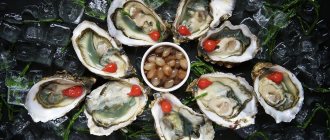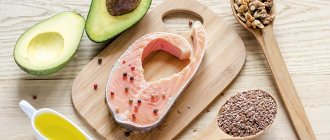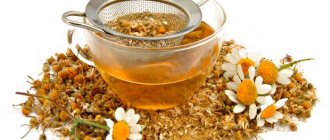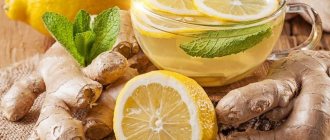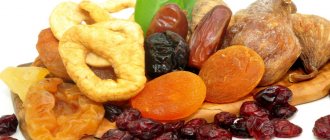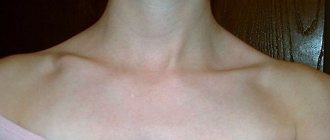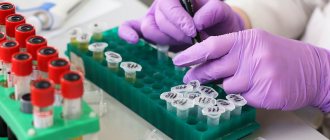The health of the cardiovascular system determines the health of the entire body. The heart and blood vessels bear a great burden and responsibility: the delivery of blood, and therefore nutrients, to each organ. If the transport channels are clogged and the heart cannot cope, the blood flow is disrupted, which leads to catastrophic consequences. According to statistics, more people die from heart and vascular diseases every year in the world than from oncology and the consequences of diabetes.
A diet rich in animal fats, sugars, and trans fats has a negative effect on the state of the cardiovascular system. These products provoke the development of atherosclerosis: sclerotic plaques narrow the lumen of blood vessels, which is why blood cannot move normally throughout the body.
Vessels narrow with decreased tone and atherosclerosis (Photo: Hahah.ru)
Products with a vasodilating effect, which reduce saturated cholesterol levels, improve the functioning of the circulatory system. Nine products have proven effectiveness.
Avocado
The overseas fruit contains unsaturated fats, which compete with saturated fats in the body. The winners are those who currently have more in the body. Avocados contain a lot of valuable fats that block the absorption of cholesterol from the intestines.
Observations by Mexican scientists have shown that daily consumption of avocados helps maintain healthy cholesterol levels and an optimal combination of low and high density lipoproteins. The fruit increases the level of “good” lipoproteins by 17 percent compared to “bad” ones.
Avocado contains valuable fats (Photo: Pixabay.com)
Causes of “narrowing” of blood vessels
Vasoconstriction can be observed in a wide range of pathologies. Arterial spasm is not a specific symptom and cannot indicate a specific disease.
This phenomenon is extremely often observed in the following conditions:
- Smoking. After each cigarette smoked, a spasm of medium- and large-caliber arteries is observed, which lasts at least 15 minutes. With chronic inhalation of tobacco smoke, the narrowing of the lumen of the vascular bed can be longer lasting.
- Frequent drinking of alcohol. As a rule, a dose equal to 20 g of pure ethanol or more per day is considered dangerous.
- Frostbite of any part of the body.
- Increased neuropsychic or physical stress.
- Frequent exposure to changing ambient temperatures (for example, going from a hot room to a cold room and vice versa).
- Respiratory pathologies leading to decreased tissue oxygenation.
- Hypertension in the initial stages. At this stage, the narrowing of the vascular bed is reversible. Then there is a transformation of muscle tissue into fibrous tissue and any method of treatment by dilating the arteries is ineffective.
- Raynaud's syndrome. It can develop in a wide range of autoimmune diseases, for example, scleroderma.
- Cardiac ischemia. In response to obstruction of the coronary lumen, a reduction in smooth myocytes and a worsening of the general condition may be observed. Prinzmetal's angina deserves special attention - a reflex narrowing of the arteries that ensure the delivery of oxygen and nutrients to the heart, which develops when exposed to any irritating factors (cold, stress, overeating, active physical activity, etc.) and can lead to myocardial infarction.
To alleviate these conditions, vasodilating folk remedies can only be used as an addition to traditional treatment. Under no circumstances should you start therapy on your own without consulting a doctor. As a rule, such methods are used in conjunction with medications. This allows you to reduce the dose of medications and increase the effectiveness and safety of treatment.
Cellulose
Fiber is not an independent product, but a component of plant foods. Champions in its content are legumes, whole grains and bran, berries and fruits, vegetables. The higher the fiber content in the diet, the better the condition of the circulatory system. Coarse plant fibers work only in the intestines, but heal the entire body.
They improve intestinal motility and remove toxins from the activity of pathogenic bacteria. Fiber absorbs water, swells and creates a feeling of fullness, which reduces appetite. Removes cholesterol from the intestines and reduces the absorption of sugars from food, which serves as a prevention of diabetes mellitus and atherosclerosis.
Is it possible to drink alcohol for this purpose?
Any drink that contains ethyl alcohol has vasodilating properties - this is an axiom.
But can alcohol be used to treat atherosclerosis and high blood pressure (hypertension)? In no case, since ethyl alcohol also increases the frequency of contractions of the heart muscle, which ultimately increases the pressure and wear of the walls of capillaries, arteries, and veins. How do different alcoholic drinks work?
- Beer. When consuming only 100 - 250 milliliters, blood pressure drops (mainly due to the diuretic effect). But if you drink more, your blood pressure increases significantly, as does the overall load on the cardiovascular system. Another negative effect is a sharp increase in blood sugar levels. In case of diabetes mellitus, beer is strictly contraindicated for consumption.
- Wine. Acts in a similar way to beer. That is, when consuming only 30 - 70 milliliters, the vascular lumens of the head expand, and the pressure drops. Further (if you drink more) it increases sharply. This drink will be useful only in small quantities and if consumed not regularly. In this regard, it is better to consult a doctor, since it is necessary to take into account the individual physiology of the patient. And preference should be given to dry red wines (with low alcohol and sugar content).
- Cognac. It acts exactly like wine (it is made from so-called “wine” alcohol). But due to its strength, it almost immediately increases the heart rate and pressure on the walls of blood vessels. Therefore, it is better to avoid this drink (especially if you have liver failure).
- Vodka. Even a small amount of it increases the pressure abruptly. And although drinking vodka reduces the level of bad cholesterol, it also destroys liver cells, the gastric mucosa, and slows down the regeneration of nerve cells. A safe dose of vodka is about 15 – 20 milliliters, no more.
Overall, alcoholic beverages should not be used for this purpose. Perhaps wine, but this should definitely be discussed with your doctor and adhere to the dosage recommended by him.
Persimmon
The tender persimmon pulp is rich in fiber and pectin. In the intestines, these substances create a viscous mass that absorbs everything in its path: toxins, cholesterol, bile, heavy metal salts. Therefore, persimmon is recommended to be consumed to detoxify the body.
Persimmon also helps blood vessels: by reducing cholesterol levels, it prevents plaque from sticking to the walls of blood vessels. Plus, the fruit is rich in antioxidants - carotenoids. They have an anti-inflammatory effect and protect against cancer.
Persimmon contains carotenoids and pectin (Photo: Pixabay.com)
In recent years, the media space is literally overflowing with a variety of information about miracle diets and foods, the consumption of which will prolong life, protect against heart attack, help you lose weight, and so on. Moreover, the number of publications in the specialized literature is growing, which often contain conflicting information about the effect of certain foods on cardiovascular diseases; it can be difficult for a doctor to assess the quality of the evidence provided in support of certain dietary recommendations.
The journal JACC published dietary recommendations from a panel of US experts based on current evidence. The table below provides a summary of these recommendations.
Dietary recommendations from the point of view of the prevention of cardiovascular diseases and their complications:
| These foods have been proven to be harmful: eliminate them from your diet or limit their use | There is not enough evidence to judge the benefits or harm of these products | These products have been proven to be beneficial and should be widely recommended for consumption. |
| Coconut oil, palm oil are saturated fats that increase cholesterol levels | Liquid vegetable oils (including sunflower) | Cold pressed olive oil |
| Eggs raise cholesterol levels | Fruit/vegetable juices with pulp | Blueberries and strawberries (more than 3 servings per week) contain beneficial antioxidants |
| Fruit/vegetable juices without pulp increase your calorie intake | Products containing gluten (for people without celiac disease) | Nuts (serving about 30 grams per day, more may lead to weight gain) |
| The so-called “southern diet” is high-calorie, fatty, fried foods rich in saturated fats (eggs, processed meat products (sausage, sausages, etc.), meat by-products, sweet drinks, etc.) | Dairy products are a source of saturated fat and salt, but on the other hand - vitamins and minerals | Green leafy vegetables (especially when eaten daily) |
| Sugar added to food accelerates the formation of atherosclerotic plaques and increases the risk of cardiovascular diseases | Fermented foods (such as fermented vegetables) and seaweed - there is anecdotal evidence of possible cardiovascular benefits | Plant-based protein is much healthier than animal protein Legumes are an excellent source of plant-based protein and fiber, reducing the risk of cardiovascular disease |
| Energy drinks increase blood pressure, increase platelet aggregation, and increase the risk of heart rhythm disturbances | Dietary supplements with antioxidants in high doses | Coffee in moderation reduces the risk of stroke, diabetes, premature death and digestive tract diseases |
| Tea Improves arterial wall function, lowers cholesterol levels | ||
| Mushrooms have anti-inflammatory and antioxidant properties | ||
| Alcohol in moderation (for people without alcohol dependence, preferably along with food) - has a vasodilating, antiplatelet and anti-inflammatory effect | ||
| Omega-3 polyunsaturated fatty acids of plant origin or obtained from sea fish* improve the lipid profile, reduce the risk of cardiovascular diseases. It is preferable to choose fish varieties in which the accumulation of heavy metals, dioxins, etc. is less likely) | ||
| Vitamin B12 is an essential nutrient that should be replenished in case of deficiency |
Based on materials:
1) A Clinician's Guide for Trending Cardiovascular Nutrition Controversies. Andrew M. Freeman, Pamela B. Morris, Karen Aspry, et al. Journal of the American College of Cardiology Jul 2021, 72 (5) 553-568; DOI: 10.1016/j.jacc.2018.05.030
https://www.onlinejacc.org/content/72/5/553#ref-2
2) Trending Cardiovascular Nutrition Controversies. Andrew M. Freeman, Pamela B. Morris, Neal Barnard, et al. Journal of the American College of Cardiology Mar 2021, 69 (9) 1172-1187; DOI: 10.1016/j.jacc.2016.10.086
https://www.onlinejacc.org/content/69/9/1172?ijkey=44b3bc859b7bb67e05bc14ba58c5a65e1d4aa788&keytype2=tf_ipsecsha
The text was prepared by Ph.D. Shakhmatova O.O.
Cranberry
Rich in plant antioxidants and polyphenols. Studies have shown that regular consumption of cranberries reduces the risk of cardiovascular diseases by 40 percent. Contains vitamin C, which strengthens the vascular wall. And potassium, necessary for the proper functioning of the heart muscle.
Cranberries are especially beneficial for the heart and blood vessels (Photo: Pixabay.com)
Top 10 Vasodilator Foods
According to the recommendations of doctors and scientists, a list of the most useful products has been compiled that promote vasodilation, but without any consequences for the liver, kidneys, or gastrointestinal tract. They are recommended to be included in the diet of everyone without exception, not to mention those patients who have had a heart attack or stroke, for whom such products are mandatory. Let us also recall that in the last article we looked at the 15 best vasodilating drinks.
Garlic
Garlic contains allicin, as well as a complex of essential oils (they are conventionally grouped into the group of “phytoncides”), which smoothly reduce blood pressure by improving the elasticity of the walls of blood vessels.
Allicin, by the way, also reduces low-density cholesterol levels, so garlic can be used to prevent atherosclerosis.
Ginger
Ginger root also has vasodilating properties . It also contains allicin, but in smaller quantities.
Its key benefit is strengthening the immune system, normalizing the biochemical composition of the blood, as well as quickly removing toxins from the body that accumulate during infectious infection.
It is they who most often provoke the thinning of the walls of blood vessels, which, when they expand, can lead to rupture of capillaries and arteries (this is what is called a stroke). Ginger is also good for the heart and blood vessels.
Lemon
Lemon expands the lumens slightly, so it reduces blood pressure only in combination with, for example, green tea .
But the large amount of ascorbic acid found in lemon reduces the concentration of cholesterol and also reduces already formed atherosclerotic plaques. With regular consumption of lemon, the lumen of blood vessels increases naturally.
Honey
Honey contains a whole range of “rare” micronutrients, including zinc, copper, iron, aurum (gold), and fluorine compounds. Most of them are used in the hematopoietic function (to restore red blood cells and platelets, which reduces density and thins the blood).
Also, regular consumption of honey improves the elasticity of blood vessels - this is especially useful for varicose veins.
Kalina
Rich in phytoncides, ascorbic and other organic acids. Dilates arteries if consumed fresh . This reduces the pressure.
If you eat more than 50 grams at one time, your heart rate increases and your blood pressure increases. Therefore, viburnum should be consumed in small portions. Best with sugar or honey. Or you can mix it with raspberries - the bitterness almost completely disappears.
Most of the beneficial properties of viburnum for blood vessels disappear during heat treatment (since organic acids decompose at temperatures above 60 - 65 degrees Celsius). Therefore, you shouldn’t add it to tea - it’s better to just grind it with sugar and use it like regular berry jam. You can use dried berries.
Cranberry
Cranberries contain a huge amount of antioxidants (derived from vitamin E), B vitamins, and anthocyanins.
Doctors indicate that its consumption increases the level of high-density cholesterol (“good” cholesterol).
It is also noted that cranberry normalizes the balance of prothrombin in the blood, which has a positive effect on the strength of capillaries and blood vessels in the brain. These berries must be included in the diet for arterial hypertension and heart failure.
Beet
Beetroot is also a vasodilating food product, but its effect is prolonged. That is, a noticeable effect will be only after regular use.
At the same time, it cleanses the intestines well of accumulated dense feces and toxins - this reduces the rate of development of atherosclerosis, and beets also have a positive effect on cholesterol levels.
Doctors also advise preparing kvass based on beets - it does not taste like the most exquisite dish, but for the cardiovascular system it is one of the best “folk” remedies.
Green tea
Green tea dilates blood vessels much better than regular black tea. It has a mild effect, reduces blood pressure, but can cause insomnia - it is better to drink in the morning or at lunch, but not later.
Can be combined with lemon or cranberry juice.
Green tea acts as a diuretic, while reducing the concentration of sodium in the blood. This is especially useful for diabetes mellitus, when potassium is actively washed out. And excess sodium leads to microdamage to the internal walls of blood vessels, where atherosclerotic plaques subsequently form. The recommended daily intake of green tea is 2 cups (based on 2 grams of dry base per cup).
Horseradish
Its action is similar to garlic - it is the phytoncides and essential oils that give it its specific taste and smell. It also acts as an antibacterial agent, but if consumed excessively, it can cause dysbacteriosis (since not only harmful but also beneficial bacteria are destroyed).
The recommended daily intake is up to 30 grams. Horseradish improves the functioning of blood vessels by increasing their elasticity and acts as a simple spasm.
Strawberry
The composition contains a large amount of ascorbic acid and digestible fiber (which, like a sponge, accumulates moisture).
Nutritionists recommend adding strawberries to oatmeal for breakfast - this normalizes the sugar balance, reduces blood pressure, prevents the appearance of edema, but at the same time provides the body with a large portion of energy (since oatmeal contains easily digestible carbohydrates and fiber).
Just keep in mind that excessive consumption of strawberries can cause allergies (especially often in children).
